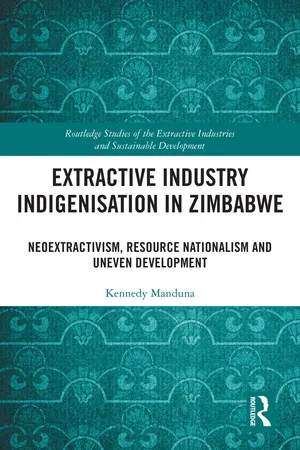
Extractive Industry Indigenisation in Zimbabwe
Neoextractivism, Resource Nationalism and Uneven Development
- English
- ePUB (mobile friendly)
- Available on iOS & Android
Extractive Industry Indigenisation in Zimbabwe
Neoextractivism, Resource Nationalism and Uneven Development
About this book
This book explains how and why Zimbabwe's extractive industry Indigenisation over-promised its benefits yet under-delivered upon implementation.
This book traces the history of uneven development in Zimbabwe from the initial days of colonialism to the present, using the extractive industry as the unit of analysis to carve out a granular and empirical analysis of the preponderance of transnational corporate control and ownership in the country. Indigenisation of Zimbabwe's extractive industries was intended to address mining inequalities by transferring wealth from rich non-Indigenous mining capital to disadvantaged Indigenous citizens and communities. This policy, however, was a response to political, economic, and social crises posed by the international isolation of Zimbabwe's government following the controversial Fast Track Land Reform Programme in 2000–2003. An intervention, therefore, which promised to address inequalities has thus been hampered by corruption, co-optation, and collusion which has led to it not only failing to address uneven development, but in actual fact worsening the situation. By examining the hidden structures and infrastructures of power, capital, and minerals and placing extractive industry Indigenisation in capitalism, this book makes a crucial scholarly contribution to the renewed and burgeoning debates around the resurgence of resource nationalism in general and the struggle for economic sovereignty in particular. This book steers readers more broadly to look for new and diversified ways of empowering Indigenous populations and their communities through mining Indigenisation in ways that do not threaten economic and political stability.
This book will be of great interest to students and scholars of the extractive industries, natural resource management, African politics, and African development.
Frequently asked questions
- Essential is ideal for learners and professionals who enjoy exploring a wide range of subjects. Access the Essential Library with 800,000+ trusted titles and best-sellers across business, personal growth, and the humanities. Includes unlimited reading time and Standard Read Aloud voice.
- Complete: Perfect for advanced learners and researchers needing full, unrestricted access. Unlock 1.4M+ books across hundreds of subjects, including academic and specialized titles. The Complete Plan also includes advanced features like Premium Read Aloud and Research Assistant.
Please note we cannot support devices running on iOS 13 and Android 7 or earlier. Learn more about using the app.
Table of contents
- Cover
- Half Title
- Series Page
- Title Page
- Copyright Page
- Table of Contents
- Preface
- 1 Introduction: Extractive Industry Indigenisation and the Violent Interregnum
- 2 Neoextractivism, resource nationalism, and green imperialism
- 3 The colonial mining regime: Extractivism, accumulation, and dispossession
- 4 But then what is Indigenisation?
- 5 Contested framings of indigeneity and impact on Indigenisation in Zimbabwe
- 6 Community Share Ownership Trusts: The controversies around them
- 7 The Indigenisation Programme and the Natural Capital Accounting in Zimbabwe
- 8 Political settlements and Zimbabwe’s extractive industry Indigenisation
- 9 Business fronting, beneficial ownership, and political settlements
- 10 Regime survivalism and private accumulation of public resources objectives
- 11 Green colonialism, the Second Republic, and the reversal of the Indigenisation Programme
- 12 Conclusion: Policy recommendations and the proposed way forward
- Index